#astor academy
Text
'The Maltese Falcon' Movie and 4K Review
The following review was written by Ultimate Rabbit correspondent, Tony Farinella.
“The Maltese Falcon” is a film I imagine I will enjoy a lot more on a second viewing, as this was my first time watching it. The reason I say this is because there are a lot of moving pieces in this film, and it is never boring. However, at times, I found myself trying to follow the story and the plot instead of…

View On WordPress
#1940&039;s Movies#1941 Movies#4K#4K Ultra HD#Academy Award Theater Broadcast#Black and White movies#Book To Film#Classic Movies#Dashiell Hammett#Elisha Cook Jr.#Eric Lax#Film Noir#Humphrey Bogart#Jerome Cowan#John Doughboy#John Huston#Lux Radio Theater Broadcast#Makeup#Mary Astor#Peter Lorre#Satan Met a Lady#Screen Guild Theater Broadcast#Sergeant York#Sydney Greenstreet#The Gay Parisian#The Maltese Falcon#Tony Farinella#Warner Brothers#Warner Night at the Movies#WB100
1 note
·
View note
Text
(Mostly) Lost, but Not Forgotten: Omar Khayyam (1923) / A Lover’s Oath (1925)

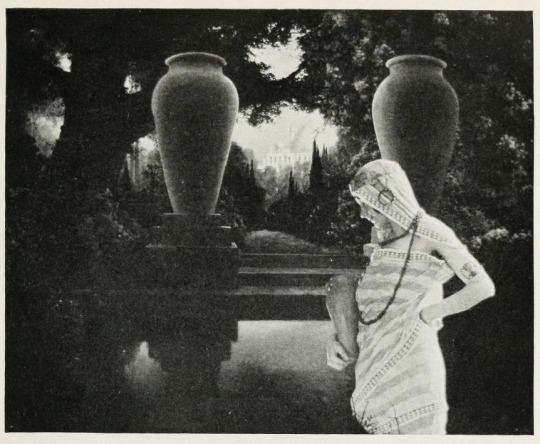
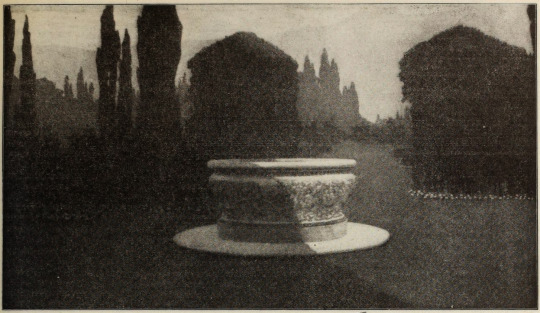

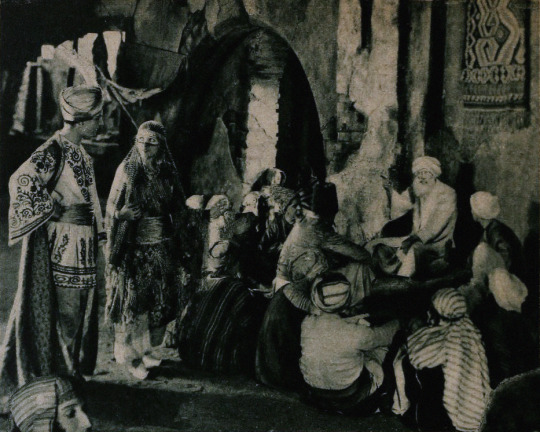

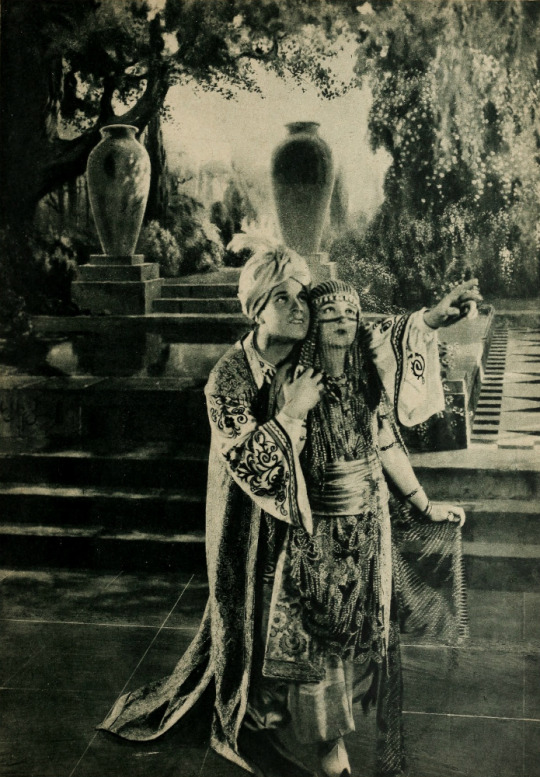
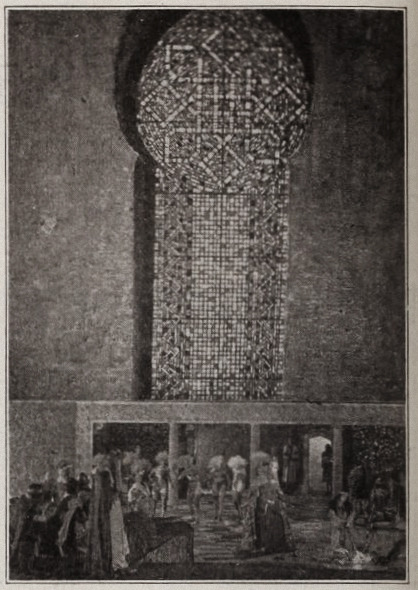
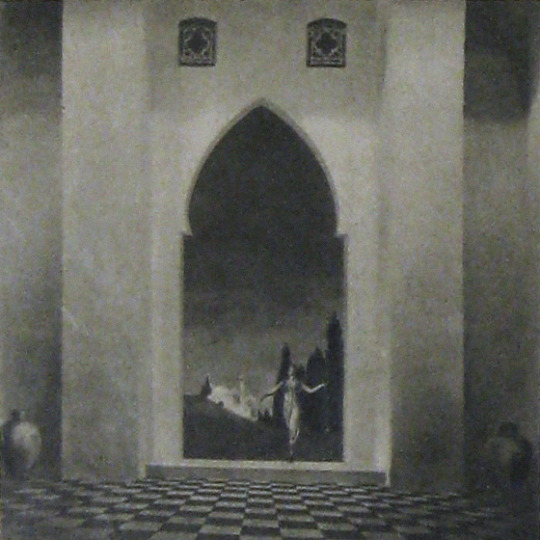
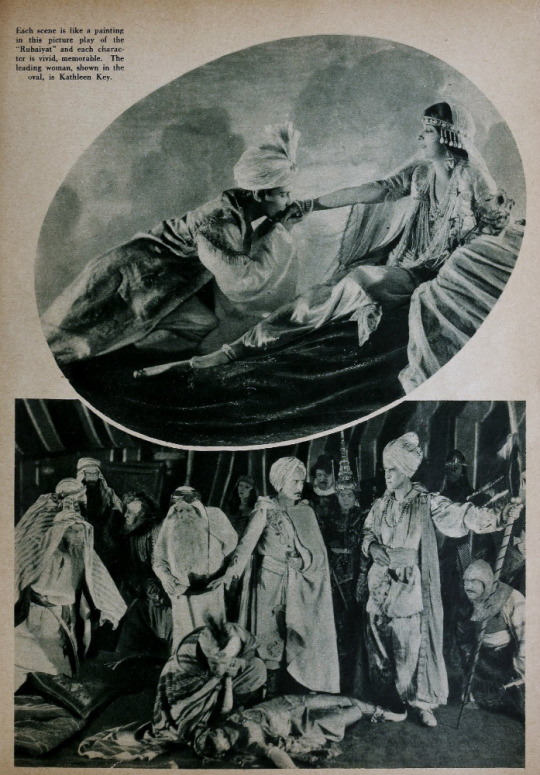
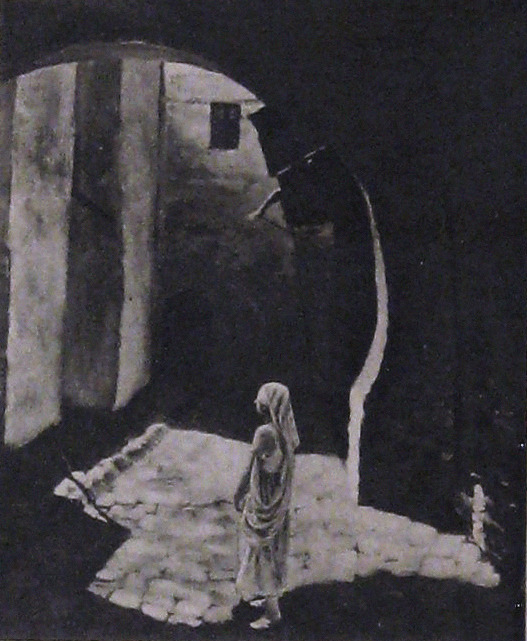

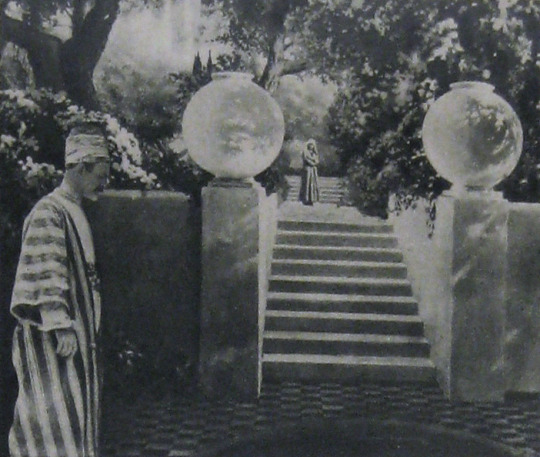
Alternate Titles: The Rubaiyat of Omar Khayyam, The Rubaiyat, Omar Khayyam, Omar
Direction: Ferdinand Pinney Earle; assisted by Walter Mayo
Scenario: Ferdinand P. Earle
Titles: Marion Ainslee, Ferdinand P. Earle (Omar), Louis Weadock (A Lover’s Oath)
Inspired by: The Rubaiyat of Omar Khayyam, as edited & translated by Edward FitzGerald
Production Manager: Winthrop Kelly
Camera: Georges Benoit
Still Photography: Edward S. Curtis
Special Photographic Effects: Ferdinand P. Earle, Gordon Bishop Pollock
Composer: Charles Wakefield Cadman
Editors: Arthur D. Ripley (The Rubaiyat of Omar Khayyam version), Ethel Davey & Ferdinand P. Earle (Omar / Omar Khayyam, the Director’s cut of 1922), Milton Sills (A Lover’s Oath)
Scenic Artists: Frank E. Berier, Xavier Muchado, Anthony Vecchio, Paul Detlefsen, Flora Smith, Jean Little Cyr, Robert Sterner, Ralph Willis
Character Designer: Louis Hels
Choreography: Ramon Novarro (credited as Ramon Samaniegos)
Technical Advisors: Prince Raphael Emmanuel, Reverend Allan Moore, Captain Dudley S. Corlette, & Captain Montlock or Mortlock
Studio: Ferdinand P. Earle Productions / The Rubaiyat, Inc. (Production) & Eastern Film Corporation (Distribution, Omar), Astor Distribution Corporation [States Rights market] (Distribution, A Lover’s Oath)
Performers: Frederick Warde, Edwin Stevens, Hedwiga Reicher, Mariska Aldrich, Paul Weigel, Robert Anderson, Arthur Carewe, Jesse Weldon, Snitz Edwards, Warren Rogers, Ramon Novarro (originally credited as Ramon Samaniegos), Big Jim Marcus, Kathleen Key, Charles A. Post, Phillippe de Lacy, Ferdinand Pinney Earle
Premiere(s): Omar cut: April 1922 The Ambassador Theatre, New York, NY (Preview Screening), 12 October 1923, Loew’s New York, New York, NY (Preview Screening), 2 February 1923, Hoyt’s Theatre, Sydney, Australia (Initial Release)
Status: Presumed lost, save for one 30 second fragment preserved by the Academy Film Archive, and a 2.5 minute fragment preserved by a private collector (Old Films & Stuff)
Length: Omar Khayyam: 8 reels , 76 minutes; A Lover’s Oath: 6 reels, 5,845 feet (though once listed with a runtime of 76 minutes, which doesn’t line up with the stated length of this cut)
Synopsis (synthesized from magazine summaries of the plot):
Omar Khayyam:
Set in 12th century Persia, the story begins with a preface in the youth of Omar Khayyam (Warde). Omar and his friends, Nizam (Weigel) and Hassan (Stevens), make a pact that whichever one of them becomes a success in life first will help out the others. In adulthood, Nizam has become a potentate and has given Omar a position so that he may continue his studies in mathematics and astronomy. Hassan, however, has grown into quite the villain. When he is expelled from the kingdom, he plots to kidnap Shireen (Key), the sheik’s daughter. Shireen is in love with Ali (Novarro). In the end it’s Hassan’s wife (Reicher) who slays the villain then kills herself.
A Lover’s Oath:
The daughter of a sheik, Shireen (Key), is in love with Ali (Novarro), the son of the ruler of a neighboring kingdom. Hassan covets Shireen and plots to kidnap her. Hassan is foiled by his wife. [The Sills’ edit places Ali and Shireen as protagonists, but there was little to no re-shooting done (absolutely none with Key or Novarro). So, most critics note how odd it is that all Ali does in the film is pitch woo, and does not save Shireen himself. This obviously wouldn’t have been an issue in the earlier cut, where Ali is a supporting character, often not even named in summaries and news items. Additional note: Post’s credit changes from “Vizier” to “Commander of the Faithful”]
Additional sequence(s) featured in the film (but I’m not sure where they fit in the continuity):
Celestial sequences featuring stars and planets moving through the cosmos
Angels spinning in a cyclone up to the heavens
A Potters’ shop sequence (relevant to a specific section of the poems)
Harem dance sequence choreographed by Novarro
Locations: palace gardens, street and marketplace scenes, ancient ruins
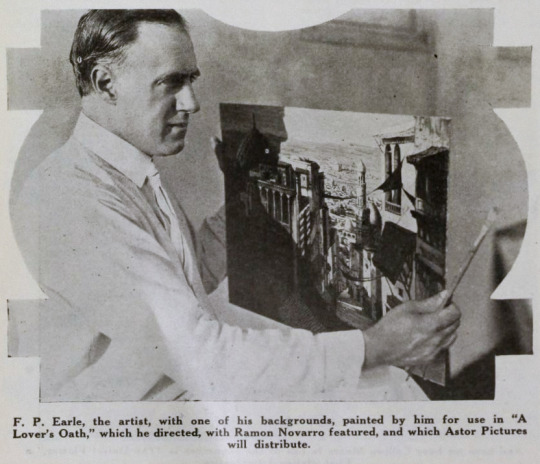
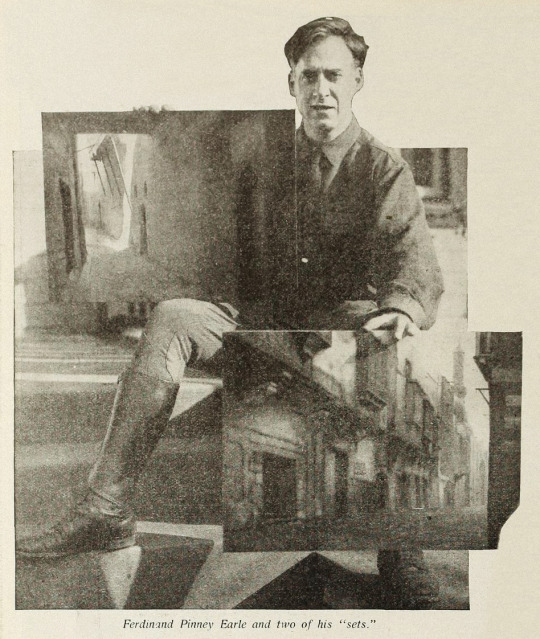
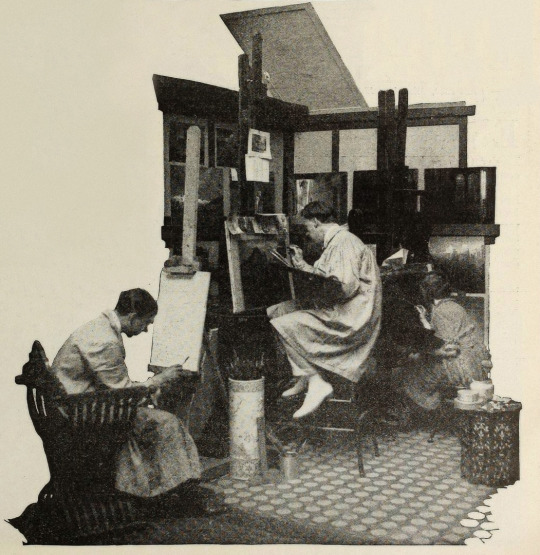
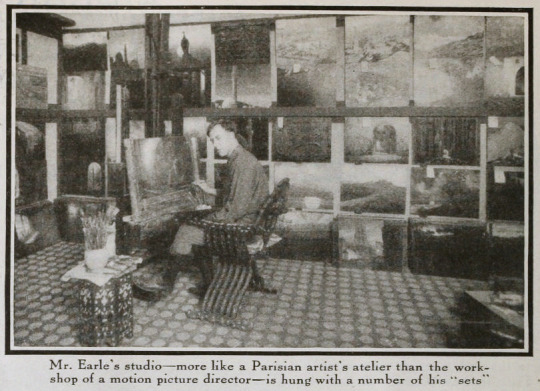
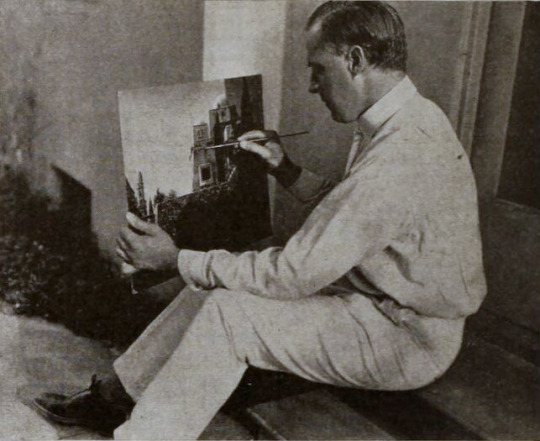
Points of Interest:
“The screen has been described as the last word in realism, but why confine it there? It can also be the last word in imaginative expression.”
Ferdinand P. Earle as quoted in Exhibitors Trade Review, 4 March 1922
The Rubaiyat of Omar Khayyam was a massive best seller. Ferdinand Pinney Earle was a classically trained artist who studied under William-Adolphe Bougueraeu and James McNeill Whistler in his youth. He also had years of experience creating art backgrounds, matte paintings, and art titles for films. Charles Wakefield Cadman was an accomplished composer of songs, operas, and operettas. Georges Benoit and Gordon Pollock were experienced photographic technicians. Edward S. Curtis was a widely renowned still photographer. Ramon Novarro was a name nobody knew yet—but they would soon enough.
When Earle chose The Rubaiyat as the source material for his directorial debut and collected such skilled collaborators, it seemed likely that the resulting film would be a landmark in the art of American cinema. Quite a few people who saw Earle’s Rubaiyat truly thought it would be:
William E. Wing writing for Camera, 9 September 1922, wrote:
“Mr. Earle…came from the world of brush and canvass, to spread his art upon the greater screen. He created a new Rubaiyat with such spiritual colors, that they swayed.”
…
“It has been my fortune to see some of the most wonderful sets that this Old Earth possesses, but I may truly say that none seized me more suddenly, or broke with greater, sudden inspiration upon the view and the brain, than some of Ferdinand Earle’s backgrounds, in his Rubaiyat.
“His vision and inspired art seem to promise something bigger and better for the future screen.”
As quoted in an ad in Film Year Book, 1923:
“Ferdinand Earle has set a new standard of production to live up to.”
Rex Ingram
“Fifty years ahead of the time.”
Marshall Neilan
The film was also listed among Fritz Lang’s Siegfried, Chaplin’s Gold Rush, Fairbanks’ Don Q, Lon Chaney’s Phantom of the Opera and The Unholy Three, and Erich Von Stroheim’s Merry Widow by the National Board of Review as an exceptional film of 1925.
So why don’t we all know about this film? (Spoiler: it’s not just because it’s lost!)
The short answer is that multiple dubious legal challenges arose that prevented Omar’s general release in the US. The long answer follows BELOW THE JUMP!
Earle began the project in earnest in 1919. Committing The Rubaiyat��to film was an ambitious undertaking for a first-time director and Earle was striking out at a time when the American film industry was developing an inferiority complex about the level of artistry in their creative output. Earle was one of a number of artists in the film colony who were going independent of the emergent studio system for greater protections of their creative freedoms.
In their adaptation of The Rubaiyat of Omar Khayyam, Earle and Co. hoped to develop new and perfect existing techniques for incorporating live-action performers with paintings and expand the idea of what could be accomplished with photographic effects in filmmaking. The Rubaiyat was an inspired choice. It’s not a narrative, but a collection of poetry. This gave Earle the opportunity to intersperse fantastical, poetic sequences throughout a story set in the lifetime of Omar Khayyam, the credited writer of the poems. In addition to the fantastic, Earle’s team would recreate 12th century Persia for the screen.
Earle was convinced that if his methods were perfected, it wouldn’t matter when or where a scene was set, it would not just be possible but practical to put on film. For The Rubaiyat, the majority of shooting was done against black velvet and various matte photography and multiple exposure techniques were employed to bring a setting 800+ years in the past and 1000s of miles removed to life before a camera in a cottage in Los Angeles.
Note: If you’d like to learn a bit more about how these effects were executed at the time, see the first installment of How’d They Do That.
Unfortunately, the few surviving minutes don’t feature much of this special photography, but what does survive looks exquisite:
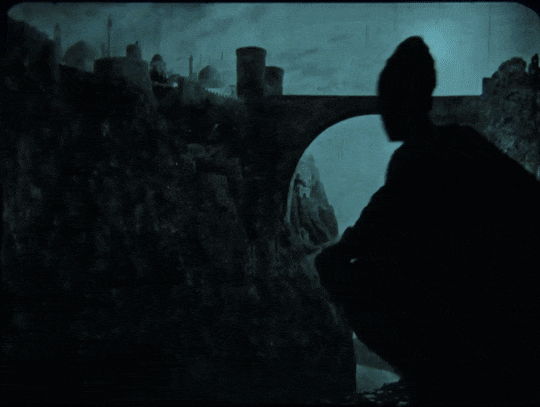
see all gifs here
Earle, knowing that traditional stills could not be taken while filming, brought in Edward S. Curtis. Curtis developed techniques in still photography to replicate the look of the photographic effects used for the film. So, even though the film hasn’t survived, we have some pretty great looking representations of some of the 1000s of missing feet of the film.
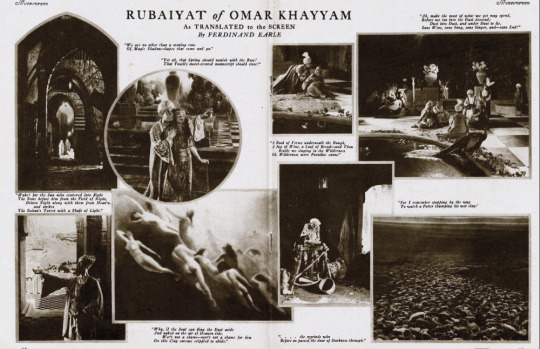
Nearly a year before Curtis joined the crew, Earle began collaboration with composer Charles Wakefield Cadman. In another bold creative move, Cadman and Earle worked closely before principal photography began so that the score could inform the construction and rhythm of the film and vice versa.
By the end of 1921 the film was complete. After roughly 9 months and the creation of over 500 paintings, The Rubaiyat was almost ready to meet its public. However, the investors in The Rubaiyat, Inc., the corporation formed by Earle to produce the film, objected to the ample reference to wine drinking (a comical objection if you’ve read the poems) and wanted the roles of the young lovers (played by as yet unknown Ramon Novarro and Kathleen Key) to be expanded. The dispute with Earle became so heated that the financiers absconded with the bulk of the film to New York. Earle filed suit against them in December to prevent them from screening their butchered and incomplete cut. Cadman supported Earle by withholding the use of his score for the film.
Later, Eastern Film Corp. brokered a settlement between the two parties, where Earle would get final cut of the film and Eastern would handle its release. Earle and Eastern agreed to change the title from The Rubaiyat of Omar Khayyam to simply Omar. Omar had its first official preview in New York City. It was tentatively announced that the film would have a wide release in the autumn.
However, before that autumn, director Norman Dawn launched a dubious patent-infringement suit against Earle and others. Dawn claimed that he owned the sole right to use multiple exposures, glass painting for single exposure, and other techniques that involved combining live action with paintings. All the cited techniques had been widespread in the film industry for a decade already and eventually and expectedly Dawn lost the suit. Despite Earle’s victory, the suit effectively put the kibosh on Omar’s release in the US.
Earle moved on to other projects that didn’t come to fruition, like a Theda Bara film and a frankly amazing sounding collaboration with Cadman to craft a silent-film opera of Faust. Omar did finally get a release, albeit only in Australia. Australian news outlets praised the film as highly as those few lucky attendees of the American preview screenings did. The narrative was described as not especially original, but that it was good enough in view of the film’s artistry and its imaginative “visual phenomena” and the precision of its technical achievement.
One reviewer for The Register, Adelaide, SA, wrote:
“It seems almost an impossibility to make a connected story out of the short verse of the Persian of old, yet the producer of this classic of the screen… has succeeded in providing an entertainment that would scarcely have been considered possible. From first to last the story grips with its very dramatic intensity.”
While Omar’s American release was still in limbo, “Ramon Samaniegos” made a huge impression in Rex Ingram’s Prisoner of Zenda (1922, extant) and Scaramouche (1923, extant) and took on a new name: Ramon Novarro. Excitement was mounting for Novarro’s next big role as the lead in the epic Ben-Hur (1925, extant) and the Omar project was re-vivified.
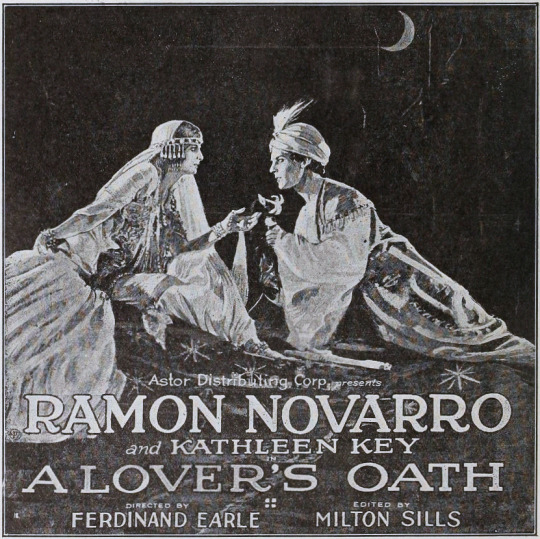
A new company, Astor Distribution Corp., was formed and purchased the distribution rights to Omar. Astor hired actor (note, not an editor) Milton Sills to re-cut the film to make Novarro and Key more prominent. The company also re-wrote the intertitles, reduced the films runtime by more than ten minutes, and renamed the film A Lover’s Oath. Earle had moved on by this point, vowing to never direct again. In fact, Earle was indirectly working with Novarro and Key again at the time, as an art director on Ben-Hur!
Despite Omar’s seemingly auspicious start in 1920, it was only released in the US on the states rights market as a cash-in on the success of one of its actors in a re-cut form five years later.
That said, A Lover’s Oath still received some good reviews from those who did manage to see it. Most of the negative criticism went to the story, intertitles, and Sills’ editing.
What kind of legacy could/should Omar have had? I’m obviously limited in my speculation by the fact that the film is lost, but there are a few key facts about the film’s production, release, and timing to consider.
The production budget was stated to be $174,735. That is equivalent to $3,246,994.83 in 2024 dollars. That is a lot of money, but since the production was years long and Omar was a period film set in a remote locale and features fantastical special effects sequences, it’s a modest budget. For contemporary perspective, Robin Hood (1922, extant) cost just under a million dollars to produce and Thief of Bagdad (1924, extant) cost over a million. For a film similarly steeped in spectacle to have nearly 1/10th of the budget is really very noteworthy. And, perhaps if the film had ever had a proper release in the US—in Earle’s intended form (that is to say, not the Sills cut)—Omar may have made as big of a splash as other epics.
It’s worth noting here however that there are a number of instances in contemporary trade and fan magazines where journalists off-handedly make this filmmaking experiment about undermining union workers. Essentially implying that that value of Earle’s method would be to continue production when unionized workers were striking. I’m sure that that would absolutely be a primary thought for studio heads, but it certainly wasn’t Earle’s motivation. Often when Earle talks about the method, he focuses on being able to film things that were previously impossible or impracticable to film. Driving down filming costs from Earle’s perspective was more about highlighting the artistry of his own specialty in lieu of other, more demanding and time-consuming approaches, like location shooting.
This divide between artists and studio decision makers is still at issue in the American film and television industry. Studio heads with billion dollar salaries constantly try to subvert unions of skilled professionals by pursuing (as yet) non-unionized labor. The technical developments of the past century have made Earle’s approach easier to implement. However, just because you don’t have to do quite as much math, or time an actor’s movements to a metronome, does not mean that filming a combination of painted/animated and live-action elements does not involve skilled labor.
VFX artists and animators are underappreciated and underpaid. In every new movie or TV show you watch there’s scads of VFX work done even in films/shows that have mundane, realistic settings. So, if you love a film or TV show, take the effort to appreciate the work of the humans who made it, even if their work was so good you didn’t notice it was done. And, if you’ve somehow read this far, and are so out of the loop about modern filmmaking, Disney’s “live-action” remakes are animated films, but they’ve just finagled ways to circumvent unions and low-key delegitimize the skilled labor of VFX artists and animators in the eyes of the viewing public. Don’t fall for it.
VFX workers in North America have a union under IATSE, but it’s still developing as a union and Marvel & Disney workers only voted to unionize in the autumn of 2023. The Animation Guild (TAG), also under the IATSE umbrella, has a longer history, but it’s been growing rapidly in the past year. A strike might be upcoming this year for TAG, so keep an eye out and remember to support striking workers and don’t cross picket lines, be they physical or digital!
Speaking of artistry over cost-cutting, I began this post with a mention that in the early 1920s, the American film industry was developing an inferiority complex in regard to its own artistry. This was in comparison to the European industries, Germany’s being the largest at the time. It’s frustrating to look back at this period and see acceptance of the opinion that American filmmakers weren’t bringing art to film. While yes, the emergent studio system was highly capitalistic and commercial, that does not mean the American industry was devoid of home-grown artists.
United Artists was formed in 1919 by Douglas Fairbanks, Charlie Chaplin, Mary Pickford, and D.W. Griffith precisely because studios were holding them back from investing in their art—within the same year that Earle began his Omar project. While salaries and unforgiving production schedules were also paramount concerns in the filmmakers going independent, a primary impetus was that production/distribution heads exhibited too much control over what the artists were trying to create.
Fairbanks was quickly expanding his repertoire in a more classical and fantastic direction. Cecil B. DeMille made his first in a long and very successful string of ancient epics. And the foreign-born children of the American film industry, Charlie Chaplin, Rex Ingram, and Nazimova, were poppin’ off! Chaplin was redefining comedic filmmaking. Ingram was redefining epics. Nazimova independently produced what is often regarded as America’s first art film, Salome (1923, extant), a film designed by Natacha Rambova, who was *gasp* American. Earle and his brother, William, had ambitious artistic visions of what could be done in the American industry and they also had to self-produce to get their work done.
Meanwhile, studio heads, instead of investing in the artists they already had contracts with, tried to poach talent from Europe with mixed success (in this period, see: Ernst Lubitsch, F.W. Murnau, Benjamin Christensen, Mauritz Stiller, Victor Sjöström, and so on). I’m in no way saying it was the wrong call to sign these artists, but all of these filmmakers, even if they found success in America, had stories of being hired to inject the style and artistry that they developed in Europe into American cinema, and then had their plans shot down or cut down to a shadow of their creative vision. Even Stiller, who tragically died before he had the opportunity to establish himself in the US, faced this on his first American film, The Temptress (1926, extant), on which he was replaced. Essentially, the studio heads’ actions were all hot air and spite for the filmmakers who’d gone independent.
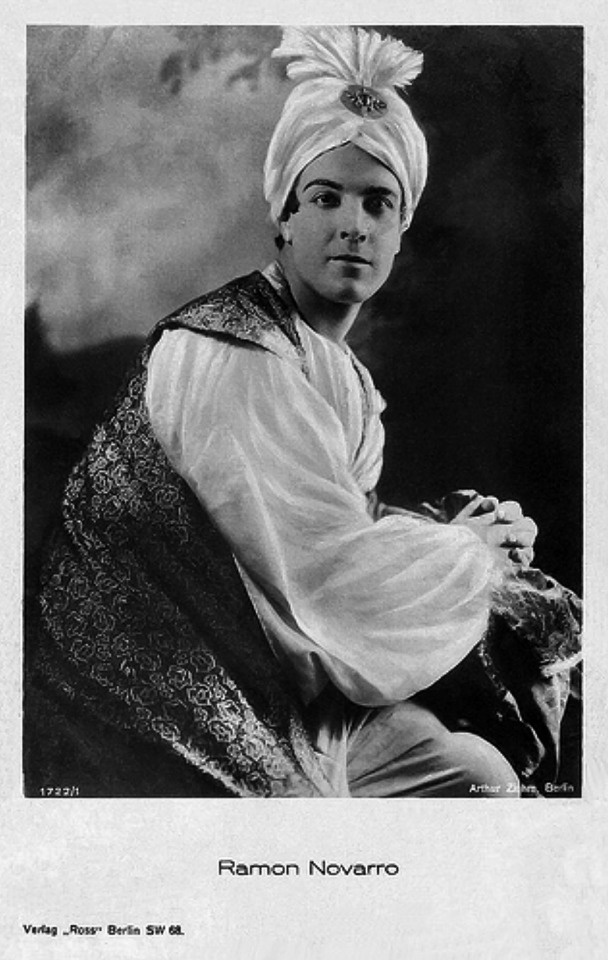
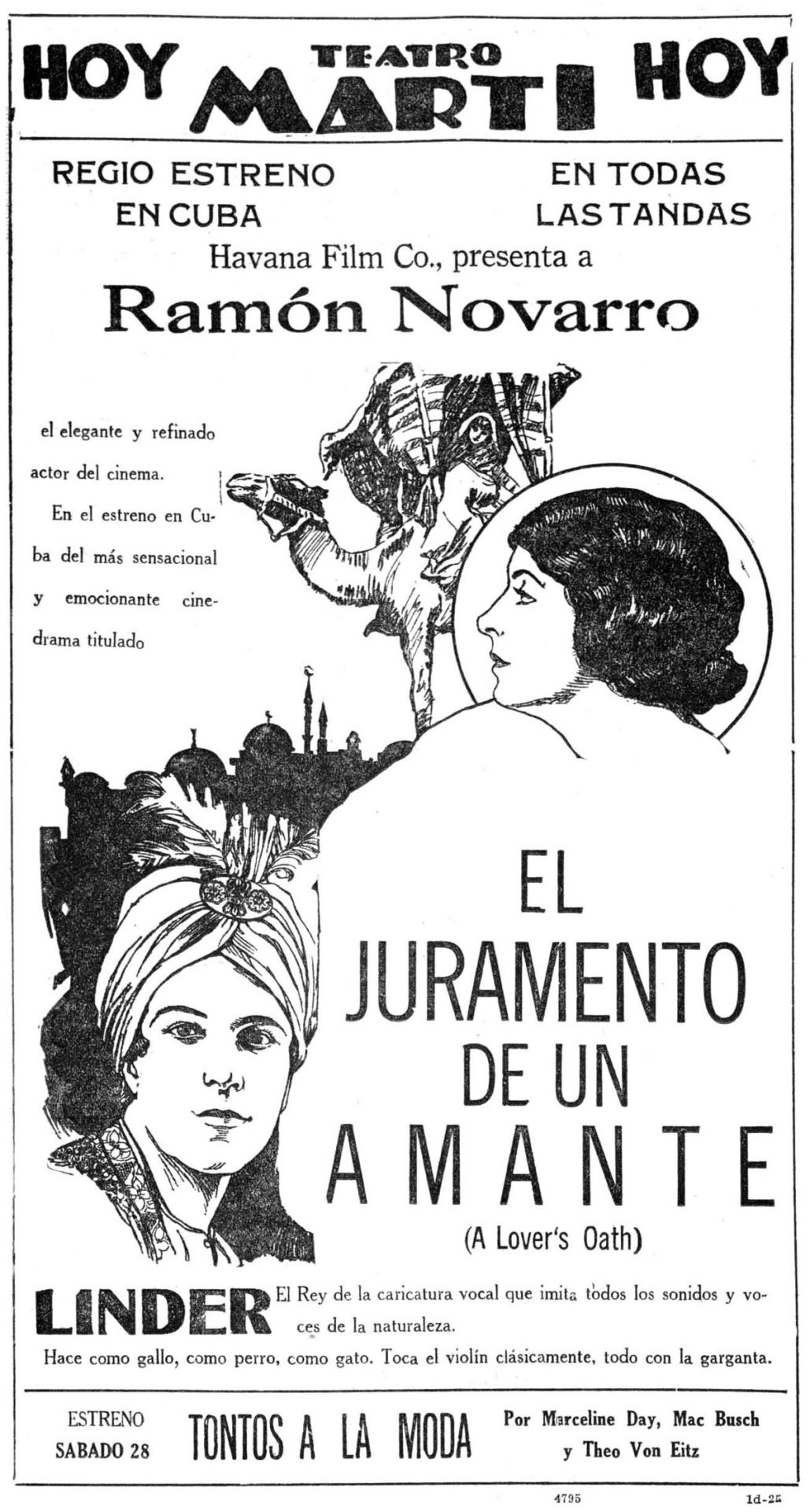
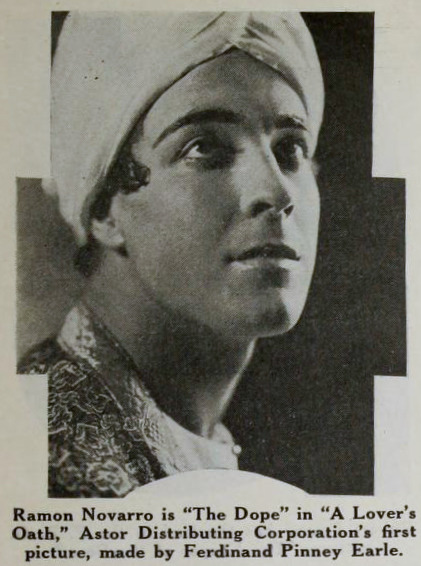
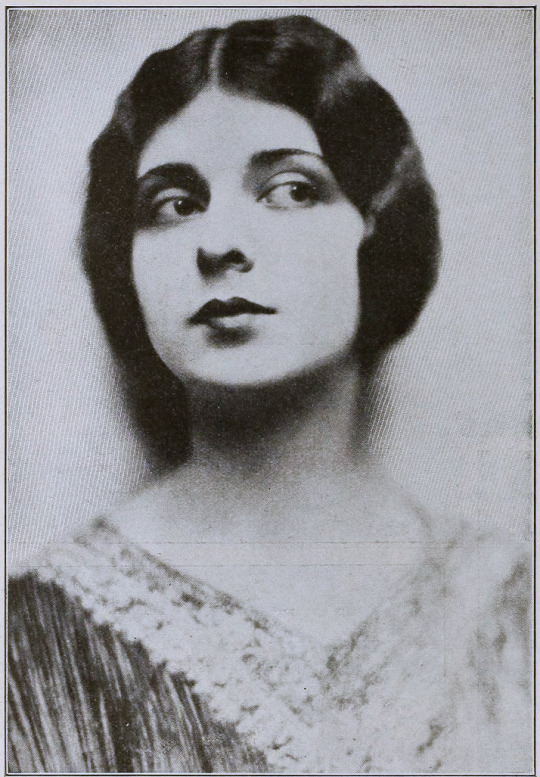
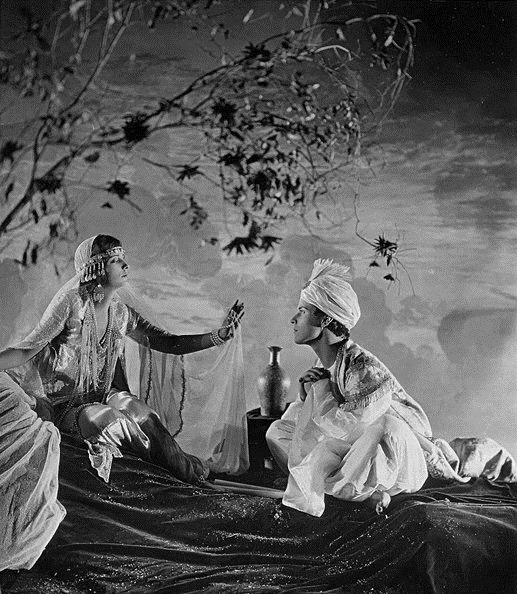
Finally I would like to highlight Ferdinand Earle’s statement to the industry, which he penned for from Camera in 14 January 1922, when his financial backers kidnapped his film to re-edit it on their terms:
MAGNA CHARTA
Until screen authors and producers obtain a charter specifying and guaranteeing their privileges and rights, the great slaughter of unprotected motion picture dramas will go merrily on.
Some of us who are half artists and half fighters and who are ready to expend ninety per cent of our energy in order to win the freedom to devote the remaining ten per cent to creative work on the screen, manage to bring to birth a piteous, half-starved art progeny.
The creative artist today labors without the stimulus of a public eager for his product, labors without the artistic momentum that fires the artist’s imagination and spurs his efforts as in any great art era.
Nowadays the taint of commercialism infects the seven arts, and the art pioneer meets with constant petty worries and handicaps.
Only once in a blue moon, in this matter-of-fact, dollar-wise age can the believer in better pictures hope to participate in a truely [sic] artistic treat.
In the seven years I have devoted to the screen, I have witnessed many splendid photodramas ruined by intruding upstarts and stubborn imbeciles. And I determined not to launch the production of my Opus No. 1 until I had adequately protected myself against all the usual evils of the way, especially as I was to make an entirely new type of picture.
In order that my film verison [sic] of the Rubaiyat of Omar Khayyam might be produced under ideal conditions and safeguarded from intolerable interferences and outside worries, I entered into a contract with the Rubaiyat, Inc., that made me not only president of the corporation and on the board of directors, but which set forth that I was to be author, production manager, director, cutter and film editor as well as art director, and that no charge could be made against the production without my written consent, and that my word was to be final on all matters of production. The late George Loane Tucker helped my attorney word the contract, which read like a splendid document.
Alas, I am now told that only by keeping title to a production until it is declared by yourself to be completed is it safe for a scenario writer, an actor or a director, who is supposedly making his own productions, to contract with a corporation; otherwise he is merely the servant of that corporation, subject at any moment to discharge, with the dubious redress of a suit for damages that can with difficulty be estimated and proven.
Can there be any hope of better pictures as long as contracts and copyrights are no protection against financial brigands and bullies?
We have scarcely emerged from barbarism, for contracts, solemnly drawn up between human beings, in which the purposes are set forth in the King’s plainest English, serve only as hurdles over which justice-mocking financiers and their nimble attorneys travel with impunity, riding rough shod over the author or artist who cannot support a legal army to defend his rights. The phrase is passed about that no contract is invioliable [sic]—and yet we think we have reached a state of civilization!
The suit begun by my attorneys in the federal courts to prevent the present hashed and incomplete version of my story from being released and exhibited, may be of interest to screen writers. For the whole struggle revolves not in the slightest degree around the sanctity of the contract, but centers around the federal copyright of my story which I never transferred in writing otherwise, and which is being brazenly ignored.
Imagine my production without pictorial titles: and imagine “The Rubaiyat” with a spoken title as follows, “That bird is getting to talk too much!”—beside some of the immortal quatrains of Fitzgerald!
One weapon, fortunately, remains for the militant art creator, when all is gone save his dignity and his sense of humor; and that is the rapier blade of ridicule, that can send lumbering to his retreat the most brutal and elephant-hided lord of finance.
How edifying—the tableau of the man of millions playing legal pranks upon men such as Charles Wakefield Cadman, Edward S. Curtis and myself and others who were associated in the bloody venture of picturizing the Rubaiyat! It has been gratifying to find the press of the whole country ready to champion the artist’s cause.
When the artist forges his plowshare into a sword, so to speak, he does not always put up a mean fight.
What publisher would dare to rewrite a sonnet of John Keats or alter one chord of a Chopin ballade?
Creative art of a high order will become possible on the screen only when the rights of established, independent screen producers, such as Rex Ingram and Maurice Tourneur, are no longer interferred with and their work no longer mutilated or changed or added to by vandal hands. And art dramas, conceived and executed by masters of screen craft, cannot be turned out like sausages made by factory hands. A flavor of individuality and distinction of style cannot be preserved in machine-made melodramas—a drama that is passed from hand to hand and concocted by patchworkers and tinkerers.
A thousand times no! For it will always be cousin to the sausage, and be like all other—sausages.
The scenes of a master’s drama may have a subtle pictorial continuity and a power of suggestion quite like a melody that is lost when just one note is changed. And the public is the only test of what is eternally true or false. What right have two or three people to deprive millions of art lovers of enjoying an artist’s creation as it emerged from his workshop?
“The Rubaiyat” was my first picture and produced in spite of continual and infernal interferences. It has taught me several sad lessons, which I have endeavored in the above paragraphs to pass on to some of my fellow sufferers. It is the hope that I am fighting, to a certain extent, their battle that has given me the courage to continue, and that has prompted me to write this article. May such hubbubs eventually teach or inforce a decent regard for the rights of authors and directors and tend to make the existence of screen artisans more secure and soothing to the nerves.
FERDINAND EARLE.
---
☕Appreciate my work? Buy me a coffee! ☕
Transcribed Sources & Annotations over on the WMM Blog!
See the Timeline for Ferdinand P. Earle's Rubaiyat Adaptation
#1920s#1923#1925#omar khayyam#ferdinand pinney earle#ramon novarro#independent film#american film#silent cinema#silent era#silent film#classic cinema#classic movies#classic film#film history#history#Charles Wakefield Cadman#cinematography#The Rubaiyat#cinema#film#lost film
44 notes
·
View notes
Text
gilded age s2 finale im waiting on that s3 renewal announcement
- not the society matrons yanking the duke around like a rag doll
- marian’s gonna have to marry RICH rich now
- is it just the lighting or is christine baranski’s wig looking greyer
- no way bertha would let gladys marry billy carlton after the way she had george drive away tom blyth last season lol
- oh she’s gonna use gladys as bait to lure the duke back to her side isn’t she
- oh noooo we finally have a face to mrs fortune
- what does bannister have against chicago lmao
- aw mr borden lent mrs bruce his jacket
- gasp not larry inviting an engaged woman to the opera with him
- and marian lying that bertha was the one to invite her!
- yas everyone roasting armstrong
- yup bertha’s gonna sell gladys to the duke
- george’s sleeves are so tight 👁️👁️
- oh naur too bad they didn’t have telephones yet back then
- “you’ll stop when we get married” oh fuck off dashiell
- homemaking IS work
- not him calling marian harriet 😭 the classic wrong name outburst
- those big ass hatpins
- “i thought you loved me” bro you assumed
- the duke tug of war is exactly the kind of frivolous nonsense i expect from anything by jf
- “where else can i find all the divorces” she’s just like me fr
- another fabulous hat from bertha
- aww mrs bruce
- “we aren’t exactly alone here” yeah i think that’s kind of the point
- also that pink dress is lovely
- marian’s opera gown is incredibly frilly
- i think i recognise the pattern of bertha’s opera gown from a worth
- “why are you all being so nice to me” because they’re going to sell you to a duke babe
- after seven episodes carrie astor returns
- wow the academy is embarrassingly empty
- mamie fish took one look and dipped lmao
- the duke is named hector???
- the plot of faust foreshadowing gladys and the duke’s marriage
- on the STOOP? in front of god and everybody?? in the year of our lord 1883???
- but we won!
- jf sure loves his letters from beyond the grave, not him recycling the matthew letter plot
- yeah of course luke was a secret heir lmao
- oh they’re all on ada’s payroll now
s3 renewal announcement when i need to see gladys’ consuelo vanderbilt ass storyline fully come into fruition
22 notes
·
View notes
Text
The Gilded Age's Broadway Divas: Aurora Fane (Kelli O'Hara)
Beloved by all, Aurora Fane enjoys a powerful position in Mrs. Astor's New York. Having suitably recovered from impending financial ruin last season, this season, Aurora has done some ill-fated matchmaking, worn some fantastic hats, and provided beautiful window dressing to scenes where she just sits there and looks pretty.
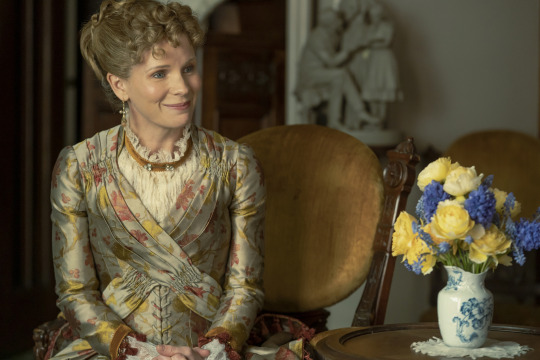
One of Broadway's (few) leading sopranos, Kelli O'Hara is a dying breed. As trends shift towards a more pop/rock sound, and classical musical theatre becomes a thing of the past, Kelli nevertheless finds her niche. A seven-time Tony nominee, Kelli has won Best Leading Actress in a Musical for the 2015 revival of The King and I. You'll recall another Gilded Age Diva who won for that same role some years prior. A proshot of the NT Live production can be found online. It is a gorgeous shoot, even if I take issue with that show as a whole.
She has also been nominated for Kiss Me, Kate (2019), The Bridges of Madison County (2014), and The Light in the Piazza (2005). Ironically, though Aurora Fane supports The Academy, Kelli is a classically trained opera singer who has appeared on the Met Opera stage three times, and will play Laura Brown in an encore run of The Hours this spring. (See my breakdown post over costumes here.)
However, prior to her opera appearance, Kelli will be starring in the new Broadway musical Days of Wine and Roses for a limited 16-week run, opening on January 28th. Kelli has been nominated for every role she has played since 2005, and this will almost certainly be no different. Booked and busy.
#1: "Shall We Dance?" The King and I (2015)
youtube
Kelli's voice is otherworldly angelic. That much we already know very well. The King and I opened in 2015 at the Vivian Beaumont Theatre at Lincoln Center, the third musical Kelli has starred in at that venue. The Beaumont is, of course, right next to The Met Opera, and the only Broadway theater outside the theatre district in Midtown.
As Anna Leonowens, Kelli travels to Siam to teach the children and wives of the king how to speak English. Orientalism aside, the show is a classic Rodgers and Hammerstein, and the score is divine in Kelli's mouth. Fun fact: Kelli's replacement was Marin Mazzie in one of her last onstage roles. Marin was the Passion co-star and dear friend to Donna Murphy, our Mrs. Astor.
This video is from the 2015 Tony performance and showcases the incredible quick change Kelli makes between singing "Getting to Know You" and "Shall We Dance?" aided by a team of unbelievable dressers. It is a marvel to witness. As is Ruthie Ann Miles, Kelli's co-star who recently performed in the Encores! production of Light in the Piazza.
#2: "What More Do I Need?" Take Me to the World: A Sondheim 90th Birthday Celebration (2020)
youtube
In 2020, despite a global pandemic, the theatre community still found a way to honor Stephen Sondheim's milestone 90th birthday with an online concert. Kelli performed a song from Saturday Night, Sondheim's first professional musical that was slated for Broadway in 1955, but was scrapped. It only got its New York premiere in 2000. This particular number is a cabaret favorite, and Kelli is an absolute delight with just a camera and digital accompaniment.
Fun fact: it wasn't until this particular performance that I truly started to appreciate the wonder that is Kelli O'Hara. I had previously seen her in concert just that March, and loved her, of course, but I have a complex relationships with sopranos. I now recognize that I love mature sopranos, but it's the ingenues I can't listen to without wincing.
#3: "They Don't Let You In the Opera" (2016)
youtube
Lest we think Kelli is limited in her range and style, this song was written especially for her to showcase her vast talent and comedic timing. Kelli, an Oklahoma farmgirl, isn't the sort of person you'd expect to be both classically trained and country literate.
Kelli, who has been typecast as refined and often repressed characters who go through harrowing emotional experiences, much like Aurora Fane, is more than capable of bringing a rollicking comedy to the mix.
This number is a favorite in Kelli's concert repertoire. There isn't much more to say, except that you need to witness its hilarity for yourself.
#4: “Heaven? Somebody else’s heaven?” The Hours (2023)
youtube
Speaking of opera, here is an excerpt from a scene in Act II where Laura Brown has fled to a hotel room to contemplate some very serious courses of action. Kelli, alongside soprano Renee Fleming and mezzo-soprano Joyce DiDonato, makes up a trio of phenomenal women in Kevin Putts' adaptation of the book and movie.
The Met Opera theatre seats nearly 4,000 people across six levels. The performers do not use body mics or amplification of any kind, but rather rely on intense vocal training to be heard across the theater. For this reason, alongside the vastly different vocal techniques and styles, musical theatre actors rarely cross over into opera, and vice versa. Notable exceptions include Renee Fleming, Kelli's Light in the Piazza co-star Victoria Clark, and Mary Beth Peil, who made her musical theatre debut in The King and I as yet another Miss Anna, hers in 1985.
#5: "So in Love," Kiss Me, Kate (2019)
youtube
Starring in yet another Golden Age musical revival, Kelli brings a different take on Lilli Vanessi, a glamorous movie star in a turbulent relationship. Kelli's vocal talent, of course, speaks for itself. For Kelli, this role was a tribute to her dear friend, the late Marin Mazzie, who had passed away some months before the show opened. Marin, who replaced Kelli in The King and I, had played this same role in the 1999 Broadway revival to great acclaim. In her first entrance of the show, Kelli wore a costume that featured the very same hat Marin wore in her show.
Though this video is beloved, my personal favorite rendition can be heard below. It was taken at a concert Kelli put on at the 92Y in New York last February. In it, Kelli sings for and to Marin, and the entire theatre wept.
Bonus: "Back to Before," Ragtime Reunion Concert (2023)
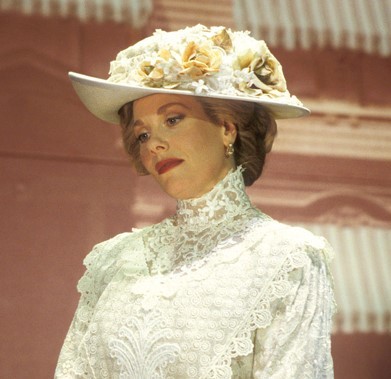
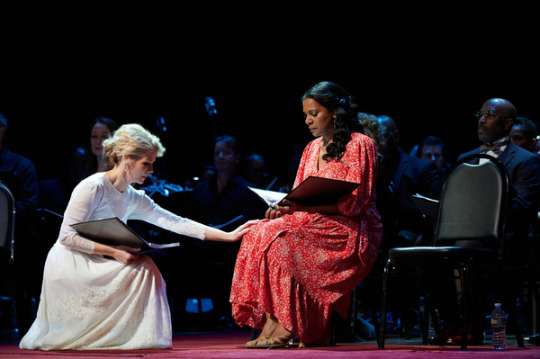
The role of Mother was originally workshopped by Donna Murphy in Toronto in the early 90s, but she left to do King and I, which worked out well for her. In came dear friend Marin Mazzie, who originated the role on Broadway, and established a precedent no other has been able to top. Also in that cast? Audra McDonald as Sarah, for which she won a Tony, of course.
In 2023, after years of pandemic-related delays, they staged a one-night reunion concert of this special show. And who better to take on Marin's iconic role than Kelli O'Hara? Listen to her "Back to Before" here, and then do yourself a favor and run, don't walk, to listen to Marin's.
#the gilded age#aurora fane#kelli o'hara#met opera#sondheim#ragtime#marin mazzie#kiss me kate#the hours#the king and i
21 notes
·
View notes
Text
youtube
The Gilded Age Season 2 | Official Trailer | HBO
Season two of THE GILDED AGE begins on Easter morning 1883, with the news that Bertha Russell's bid for a box at the Academy of Music has been rejected. Through the eight episodes of the season, we watch as Bertha challenges Mrs. Astor and the old system and works to not only gain a foothold in Society, but to potentially take a leading role in it. George Russell takes on his own battle with a growing union at his steel plant in Pittsburgh. In the Brook House, Marian continues her journey to find her way in the world secretly teaching at a girls school while much to everyone’s surprise Ada begins a new courtship. Of course, Agnes approves of none of it. In Brooklyn, the Scott family begins to heal from a shocking discovery, and Peggy taps into her activist spirit through her work with T. Thomas Fortune at the NY Globe.
From creator Julian Fellowes (“Downton Abbey”), the new season of The Gilded Age will be available to on October 29, only on Max.
#The Gilded Age#Denée Benton#Audra McDonald#Carrie Coon#Morgan Spector#Louisa Jacobson#Taissa Farmiga#T. Thomas Fortune#Sullivan Jones#series trailer#period series#Julian Fellowes#Youtube
17 notes
·
View notes
Text
The season 2 finale of The Gilded Age brought many of the show's central conflicts to a head, including whether or not The Academy or the Met would win the opera war, who the Duke of Buckingham (Ben Lamb) would choose, whether Armstrong (Debra Monk) would ever stop being a pill — and most importantly, if Larry Russell (Harry Richardson) and Marian Brook (Louisa Jacobson) would ever get together.
The moment finally arrived in the season's final scenes, and it wasn't a mere chaste brush of a gloved hand either. Standing on the doorstep of the Van Rhijn household, Larry walked Marian home from a night at the opera in the early light of dawn. She promised that even with a move on the horizon, she would keep in touch with Larry. Larry's response was to kiss her, drawing a shy, pleased smile from Marian.
Executive producer and writer Sonja Warfield tells EW that the romantic moment came after she directly solicited creator Julian Fellowes. "Julian had long game plans to get them together," she says. "Back then everything was very chaste. You didn't really kiss somebody; you shook hands or something like that. So, I really did want Marian and Larry to kiss and asked Julian if they could please kiss at the end of the season. He granted me my wish."
Though Warfield warns that if they do secure a season 3 (HBO has yet to order more of The Gilded Age), it won't just be smooth sailing through the tunnel of love. Even if Marian will now have a newly empowered Ada (Cynthia Nixon) on her side against what will no doubt be objections from Agnes (Christine Baranski). "Relationships had their challenges in 1884, and they do today," she says. "The modern challenges aren't that different from those challenges. Yes, we're rooting for them. But everything will be complicated."
EW got Warfield to break down more of the finale, including Peggy's (Denée Benton) decision to leave the paper, Ada's sudden new wealth and its implications, and the possibility that Bertha Russell (Carrie Coon) has sold her daughter, Gladys (Taissa Farmiga), to a duke solely to win a society war with Mrs. Astor (Donna Murphy).
ENTERTAINMENT WEEKLY: You all brought Ada some romance this year, only to immediately kill off poor Luke (Robert Sean Leonard). So, I have to ask, why are you so mean?
SONJA WARFIELD: Because that's drama. And back then, most of the time when people had an ache or a pain, it did mean death. I wanted to disrupt the status quo with Ada. I just adore Cynthia Nixon, and her performance was mesmerizing to me, so I wanted her to be empowered to have a love. Agnes is oppressive, and so, I wanted for her to have love and to feel loved and to understand how that helped her in the world. The heart of the show, it's about the warring classes and Ada and Agnes represent that old money, and so, they need to remain intact. That's why he couldn't stay.
Peggy decides to leave the Fortune (Sullivan Jones) paper. What will that mean for her future? She talks about a novel, but being a journalist seems like such a core part of her identity right now.
In that time period, a lot of women were writing serialized stories for newspapers, so Peggy's done some of that too. There's versatility in her writing and in her work. Listen, Fortune is great, but he's a bad influence. He drinks a little bit; he's married. Peggy has a whole future ahead of her anywhere she wants to be. So I'm excited for her.
Will she be able to stay away though?
We shall see. He is pretty cute.
Watson (Michael Cerveris) gets this happy ending where he's going to actually go and have a life with his daughter. Will we continue to follow him and how that develops in the future? Or once he leaves the Russell household, will we not really check in with him?
Now, he's going to be living as a gentleman. We've already seen Turner (Kelley Curran) cross over. Anything's possible in America at that time.
Speaking of Turner, we learn in the climax of the finale that both Bertha and George did her dirty behind the scenes, both with the opera box and learning that Bertha wrote Mrs. Astor to get the new Mrs. Winterton kicked out of the Academy. If there is a season 3, how might that come back to bite them?
Listen, she'll be conniving to take Bertha down. Turner, or Mrs. Winterton, will be in her orbit. There are crimes of opportunity that Turner will be looking out for wherever she can catch Bertha out. And remember, she was the maid and the maids know everything.
One has to assume she already is blaming the Russells for everything.
Oh, absolutely. She's a smart cookie. She knows what's going on.
Season 1 ended with this very short-lived triumph for Bertha with her party coming off. But it wasn't enough. If there is a season 3, would that be similar? She won this battle. Are there more battles for her to win?
The thing about power is that it's unquenchable. You get a taste of it, and you thirst for more. Bertha has her sights set on conquering American society.
There is a heavy implication that Bertha won the Duke of Buckingham by selling out her own daughter. Is that a fair reading of that scenario?
I think you're a smart woman and that's an astute reading. Sadly.
George also looks quite concerned with whatever might be happening with the Duke. And we did see him early in the season pledge that he was supportive of Gladys marrying someone she actually loves. So is he also suspicious? Is he still determined to stand firm to that promise?
That's something that will be tested, and we'll have to see where George and Bertha land. This season was great because we saw them, probably for the first time with their marriage, in some real jeopardy that they had not experienced before. What I loved about that is that they still emerged as this power couple, and so we'll see if they can sustain that and how much their marriage can take. Parents often want different things for their children and that can be challenging.
We've really seen the servants branch out a lot more this season, whether that be going to the opera or this overarching plot line with the alarm clock. Are we trending toward a situation conceivably where servants are leaving their profession or their power dynamic is in flux?
That's the difference between America and the U.K. You're born into a position there, but in America it's supposedly the land of opportunity. Turner married up; we'll have to see what happens with Jack and how he fits into this new world, or if he gravitates back to his old world and what really happens with it. Businesses go bust, anything's possible.
We've pretty much exclusively seen Larry interested in architecture to this point. So what would going into the alarm clock business potentially look like for him?
Money. He's young and he gets to explore a lot of things because his father's a mogul.
In the final moment, Ada warns Agnes that things might be a little different. Historically, Ada is pretty good natured. So her being in charge, what do you conceive that looking like? I feel like we're gearing up for the battle of the century between these two sisters.
Here's the thing, fighting with a sibling is so different than fighting with somebody else. You can go in and you can go deep and you can go back. It's so charged and it's so conflict ridden. At the same time, you can be at each other's throats and then the next minute, you can hug it out. What I love is that Ada didn't just get a lot of money. She was really empowered to be independent with Luke in that relationship. So the power dynamics, it'll be fun to watch what happens.
Does she hold any resentment toward Agnes for how domineering she was that we could see come out?
Listen, Agnes pushes people. Even if you were forgiving and didn't have resentment, she might stir it up again.
This cast is known for its stellar lineup of Broadway talent. Who would be your dream to join the cast next season?
Sutton Foster. That would be big fun.
17 notes
·
View notes
Text
Mary Astor - The Cameo Girl

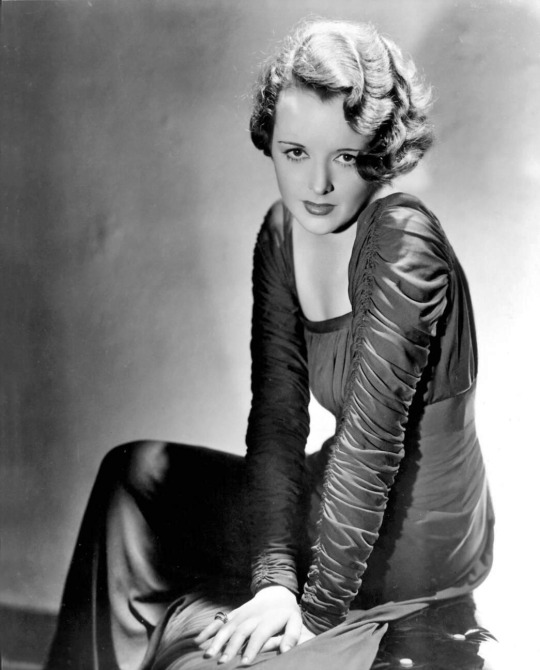
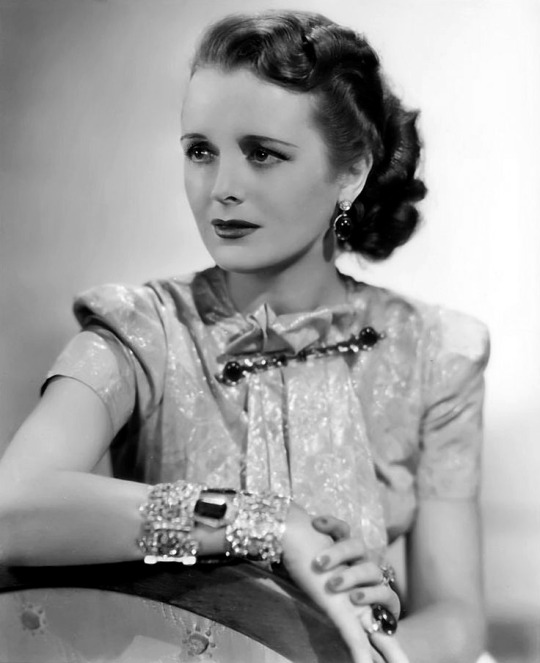
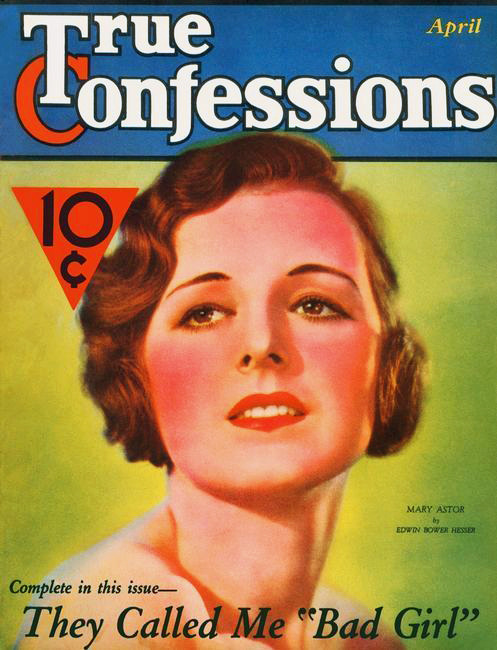
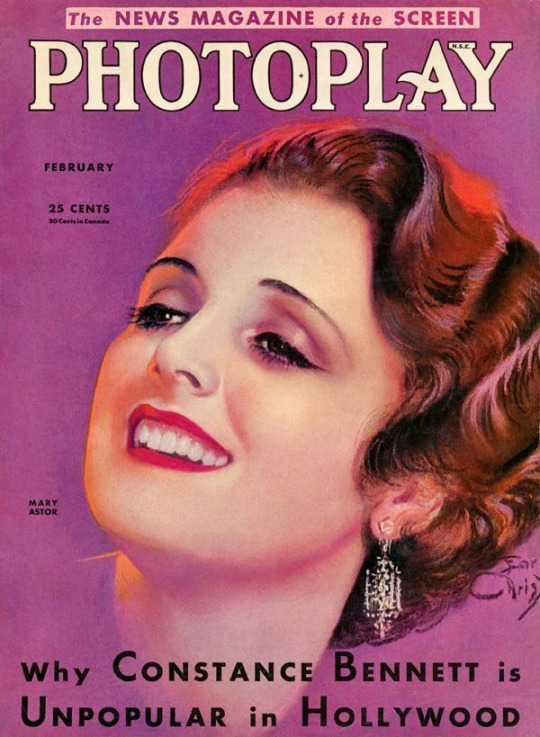
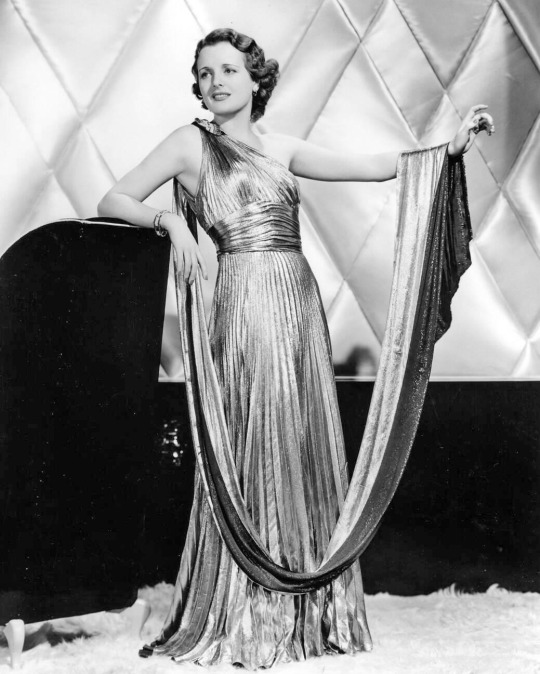
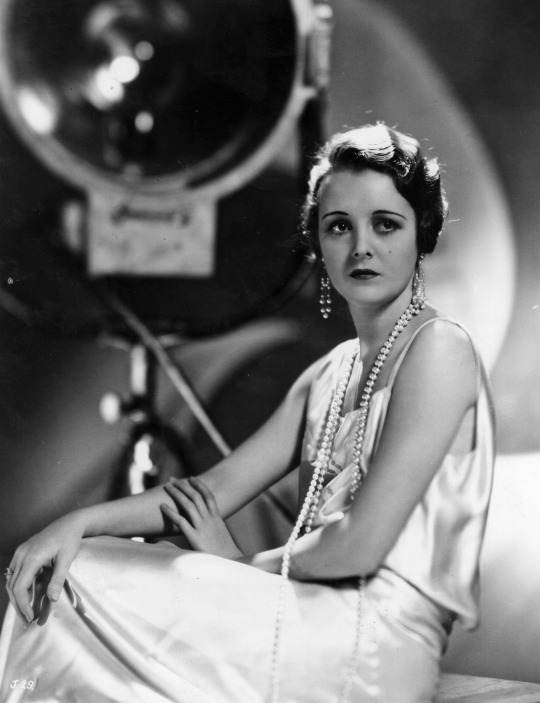
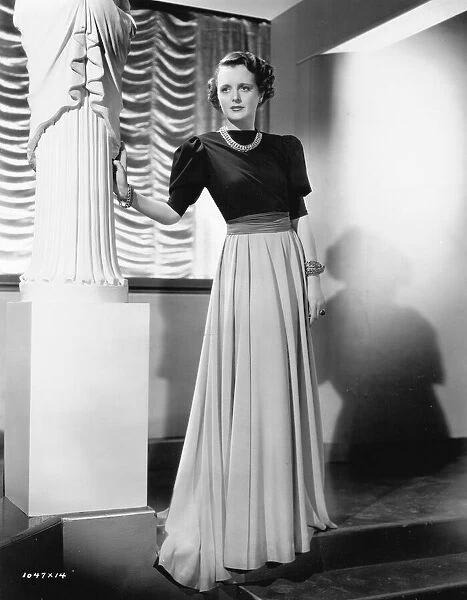



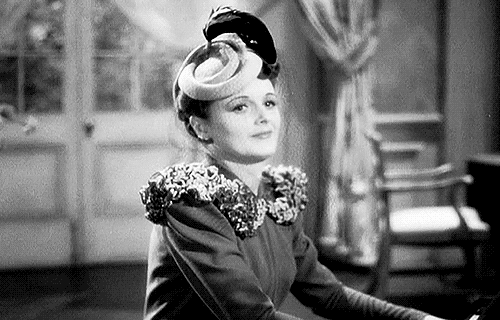
Mary Astor (born Lucile Vasconcellos Langhanke in Quincy, Illinois on May 3, 1906 – September 25, 1987) was an American actress of German and Portuguese ethnicity. She was noted for her classic beauty and a renowned profile that earned her the nickname “The Cameo Girl.”
Recognizing her beauty, her parents pushed her into various beauty contests. Luck arrived when she became a runner-up in one of Motion Picture Magazine's photography contests and came to the attention of Harry Durant of Famous Players–Lasky, who helped her get her first Hollywood contract with Paramount in 1920.
Contracts with Warner Bros. and Metro-Goldwyn-Mayer followed, and she worked in film, television, and on stage until her retirement in 1964. She also had a respectable career as a writer. Her 1959 autobiography Mary Astor: My Story was one of the first confessional autobiographies to come out of Hollywood.
Although her career spanned over four decades, she is best remembered for her performance as Brigid O'Shaughnessy in The Maltese Falcon (1941) and concert pianist Sandra Kovak in The Great Lie (1941).
After her retirement in 1964, Astor lived the final years of her life as a resident of the Motion Picture Country House in Woodland Hills, Los Angeles where she succumbed to the effects of respiratory failure due to pulmonary emphysema at the age of 81.
Legacy:
Chosen as one of the WAMPAS Baby Stars in 1926
Won the Academy Award for Best Supporting Actress in 1941
Authored two best-selling books of memoirs, Mary Astor: My Story (1959) and A Life on Film (1971) as well as five fictional novels
Honored as Turner Classic Movies Star of the Month in March 2014
Has a star on the Hollywood Walk of Fame for her contributions to motion pictures at 6701 Hollywood Boulevard
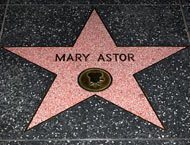
#Mary Astor#The Cameo Girl#The Maltese Falcon#Silent Films#Silent Movies#Silent Era#Silent Film Stars#Golden Age of Hollywood#Classic Hollywood#Film Classics#Classic Films#Old Hollywood#Vintage Hollywood#Hollywood#Movie Star#Hollywood Walk of Fame#Walk of Fame#Movie Legends#Actress#hollywood actresses#hollywood icons#hollywood legend#movie stars#1900s
8 notes
·
View notes
Text
I have two major predictions for the last two eps of s2 of The Gilded Age.
highly likely but I desperately don’t want it to happen: Bertha and George separate after Bertha finds out that George put his own money into the Met (nbd) and that he lied to her face about doing so (v big deal especially because iirc he lied about it in the SAME SCENE where she said please never conceal anything from me again)
unlikely but I would be delighted: Mrs. Astor, in a desperate bid to win the opera war, promises Bertha that if Bertha lets the Duke go to the opening at the Academy instead of the Met, then Mrs. Astor will marry her daughter off to Larry. but Larry, who has proven headstrong and reckless about love, does not want this. meanwhile Marian, who has already once before attempted to elope, desperately does not want to marry the guy who pressured her via public proposal. Marian and Larry elope.
now, if both these things happen, it could lead to the least likely yet most desired (by me) twist: Bertha and Agnes, united by outrage and loneliness and mutual contempt, have a torrid affair that goes from hatefucking to grudging co-conspirators who respect each other but pretend not to.
#the gilded age#bertha is based on Mrs Vanderbilt who DID get divorced which was a huge scandal and trendsetter#and Bertha loves to set trends scandalously. but Julian….. AT WHAT COST.#then again Robert and Cora on downton made it through ten thousand ups and downs#the downs included Robert being a moron in general AND Robert contributing to Sybil’s death via snobbery about doctors#and I’m gonna assume that George will neither kill Gladys nor become a total loser#so i have some hope that the Russells will eventually pull through. if and when George gets his shit together#but in the meantime it’ll be agony#i ask only that we get one (1) good sex scene each before and after the breakup#and that during the breakup bertha has an affair with Agnes#or with Carrie. or with Mrs Astor. etc.#thank you.
14 notes
·
View notes
Text

@euphonetic my criticism is that portraying the opening night at the academy as an utter failure resulted in ahistorical melodrama that undermines the narrative.
i perceive the narrative goals of the resolution of the opera war as:
reposition bertha as socially parallel and/or with superior influence to mrs. astor, playing into a larger narrative objective of upsetting the power structure of the first two seasons for more variety in the third season.
demonstrate the lengths bertha is willing to go to for social status.
set the groundwork for arranging gladys with the duke.
put a bow on mrs. fish's tendency and desire to do what is most interesting, even if it is to the left of old money expectations.
give borden and mrs bruce something cute to do, and highlight that bertha is just as willing to do her servants favors as agnes across the street. i have no criticism of any of this, 11/10 no notes!
something something the wintertons, 8/10 but those notes are for another post.
create a milestone in the overall transition of societal and social power from the old people to new money.
they achieved these goals because:
the academy of music has extremely low turnout in both boxes and floor seating, with people leaving before the opera even starts, including mrs. fish. 1, 4, and 7 ✅
the difference in demographic between high society attendees of the academy vs those at the met: those at the academy are old, even outdated, on the verge of if not already irrelevant; the met has the future. 1 and 7 ✅
the duke shows up at the met because the met is equal or superior to the academy in prominence, 1 and 7 ✅, and because bertha bribed him with gladys, 2 and 3 ✅. then he makes chitchat with the russells, 3 ✅
borden and mrs. bruce go on a cute opera date because bertha ~finds last minute tickets because another couple dropped out~. bertha, as mrs. george russell, is literally the largest donor and could have reserved orchestra seats at any previous time, and they leave it open to inference as to whether that's actually the explanation or if she just bought them tickets. 5 ✅
mrs. winterton is displaced from the box she thinks she has at the academy — and mr. winterton can scheme right along with her. 6 ✅
setting aside 4 & 5 which on the whole i am quite happy with, Thanks I Hate It. the root of why i hate it is because:
it's ahistorical. the academy of music did not have low attendance on opening night of the 1883 season, let alone as sparse as shown in tga. that did not happen in real life. (still ahistorical: this was far from the nail in the coffin on mrs. astor's social influence, which regardless of what happens in a third season is how tga's audience is interpreting what happened. but that was a goal of the narrative so i am going to set this aside for now.)
and not only did they did not have to be completely ahistorical to make their point, they could have enhanced their point by following history a little more closely and being more realistic.
for example, they could have:
at the academy, shown an almost or mostly full floor, with fewer full boxes
at the academy, shown that the boxes that are occupied are occupied mainly by an older demographic
had the duke show up at the met exactly as shown
which would have:
demonstrated bertha's rise in social influence and expanded possibility for social connections based on her material wealth
further illustrated the collapse of the old money vs new money dichotomy — it doesn't matter who is at the academy, the Right People are not at the academy, and not only that, but the Right People is changing from the old guard, who are attending the academy which we as the audience know fails and becomes irrelevant, to the new, but that new money and young old society are much more willing to mingle than old.
lay the groundwork for the show to later capitalize on the historical future of the academy as a no longer prestigious venue for vaudeville
not shot themselves in the foot for any future conflict between bertha and mrs. astor or bertha and old society, because old society still has some allegiance to mrs. astor.
allowed mrs. astor to follow through on her threat to have met box holders give up their boxes at the academy, which went nowhere on screen and so may as well have been empty
bertha wins the opera war, but with a catch: there are still relevant people aligned with mrs. astor, and if bertha wants to win them over she will have to have the duke on her side permanently
bertha wins the opera war, but for what, and at what cost: she still is not fully accepted by old society, she still has reason to want to be fully accepted by old society, and selling her daughter to the duke won her a battle but clearly not the war.
which brings me to the problem, i think, of resolving goal #1 above all the way in one scene.
in presenting bertha winning the opera war as also winning the society war, they have undermined future motivation for bertha to still work toward acceptance and for that vehicle of acceptance to be marrying gladys to the duke. that, historically, is what actually won the society war for the individual families the russells are based on (such as but not limited to the vanderbilts).
because what's the point now? either they walk back the conclusion of the season finale where it is said outright that bertha won (my money is on this one), or they erode any shred of sympathy the audience has for bertha in marrying gladys off because bertha already won—if bertha's s1 goal of gaining acceptance to society through the acceptance of mrs. astor is made irrelevant because mrs. astor is irrelevant, why is bertha still doing what she's doing, and why does the audience want to keep watching it? (i think "you've already won" will be george's position anyway.)
i know me and my tolerance for suspension of disbelief, i'll probably end up being fine when we actually get a season 3, but until then i'm gonna be grumpy about it.
8 notes
·
View notes
Text
The Gilded Age, 02x07, Wonders never Cease. My thoughts
This episode was a fucking roller-coaster of a ride! One moment I'm crying then next I'm happy for someone, next I'm completely suspicious of one certain rich mrs. pain in ass.
First to everyone that was on to Muade Beaten right off the bat y'all get million brilliant points and I completely apologize for ever doubting any of you. Omg y'all were so right!! I truly didn't believe she was part of the scam. She freakin good! Give her award for that shit. At the same time I'm sad because I wanted her to be on the up and up. I really liked her, especially with Oscar. They made a cute couple. Omg poor Oscar, I just wanted to hug him when he started crying at John's place and I started crying for Oscar. Then when he tells Aunt Agnes how much money he lose, I started crying for all of them. Because I thought he had just used his individual money for the investment not his mother's money also. That's when I was oh no no no Oscar!! This has to be ok somehow, it just has too.
Then if that wasn't hard enough they have Luke pass away. I was just sobbing when Aunt Ada woke up he was gone. It's just awful that they were together for such a short time. Aunt Ada deserves so much more than just a taste of happily married bliss. My heart just brakes for her. At the same time I am glad she got to be loved like that and love someone in that way.
I did love what Aunt Agnes said to Luke when they were alone. It was also wonderful getting to see that side of her, Aunt Agnes truly loves and cares for her family. Even though she has this tough outer exterior, once you get pass that she's quite loving and she a softness about her. I like how she take her role as head of her family, all her family seriously. Aunt Agnes will always be the strength, the backbone, the true North for them. No matter if it takes kicking their ass or loving them like mad but most likely both she will be there doing it. Aunt Agnes over this season especially has become another of my favorite characters.
Ok once again not enough Bertha in the episode! I think we got spoiled last season because the show kinda revolved around Bertha and the Russell's. But this season their expending the other characters story lines more so we're getting less of what I want the most Bertha. Maybe they could made TGA two hours long episodes. I totally watch them!!
But onto what we did get. First fucking Mrs. Astor, suddenly all oh I got you box at the Academy of music. Yea like Bertha wasn't gonna be what this bitch up to. Mrs. Astor overly nice, her voice dripping with enough sugar put Bertha into glucose shock. Mrs. Astor should work on her fake nice act it's really transparent to anyone that can smell bullshit at 1000 feet. Then the stunt she pulled at Aurora's just made her look stupid not Bertha. But I so did love Bertha's crystal clear No, than she's all look bitch I never told you for sure I was doing that. Why are bringing up now, don't look so smug you haven't won anything. I'm not about to be your lackey. Mrs. Astor getting all huffy and leaveing she's just so pathetic omg. Mrs. Astor really thought she got the better hand of Bertha Russell with her stealing the Duke not with standing. But she simply can't Bertha far more intelligent, cunning, calculated and purely ruthless then Mrs. Astor. On flip side of that Bertha is also friendly, sweet, fun, kind and sincere. Where Mrs. Astor full of crap there's nothing sincere about her, she's all fake nice and attitude. I think she far to use to people kissing her ass and getting her way. We all know Bertha isn't going to do that. I'm so ready to see what happens at the opening night at both opera houses!!
I'm so happy for Jake! Mr. Bannister all casual oh I write my friend in German clock makers group for you. I really do like how there like a little family at the Van Rhijn house (with the exception of Armstrong). I really hope Jake gets his pattern, then goes on to be a clock maker if that's what he wants.
I don't have any idea why Marian is trying to convince herself to marry Dashiell. She's not in love with him, what she going to do wait until she's actually married to the man than be like I made mistake here. I wish she could be as brave for herself as she for everyone else. It's like this all she think she deserves is a loveless marriage at least on her side so she'll doom herself to it. Instead of being brave and looking for what deserves a love like Aunt Ada found. Which might be with one Larry Russell.
I adored the scene with Bertha and George. It's always a treat getting to see Bertha with her hair down all related in her night clothes. I really love that show has a in love married couple at core of it. It's not too much or too little, it's just right as Goldie Locks would say. They have reached the ideal balance for a loving marriage couple in a series, now all other series take note please. They are very endearing. When Bertha sat on George's lap such a romantic thing to do. I really do enjoy their scene together. Ever if their just talking. 😍
I was hoping George would end up being a good guy with his workers, treat them as human beings but so far he's still being ruthless ass. It's so hard with him, when he's with Bertha and his children I really like him, but as soon as he's all business I can't stand him. It drives me nuts.
I'm so happy to see Peggy stand her ground. But I do wonder how long that's going to go on for? Her boss doesn't even seem to give a second thought about his wife or family, just going to listen to his dick. Because let's be honest that's what he's doing. I just don't like him there's something about him the rubs me the wrong way, beyond the I'm so easily willing to cheat on my wife. I definitely feel he's done this before. Peggy might want to find out how many other babies he has around! I just get this feeling off him it's more like he wants to own Peggy untilhe gets bored then he moves on to the the next woman. I hope a really good guy comes into Peggy's life that's not married and sweeps her off her feet.
I really like what Larry did with his speech making sure that at least people in that room which did include the President know that Mrs. Roebling did the work on Brooklyn Bridge. I hope she knew that she wasn't forgotten in history. I learned about her college in my women in America history course. Now thanks to The Gilded Age so many more know her incredible story and she's come back to life in a way that makes the history even more exciting.
Oh I almost... I love when Mr. Baudin ask Mrs. Bruce if she going to watch the fireworks. I was omg the roof of the house! Because that house has to tall enough. I was happy I was correct. I thought I was so sweet he took up there so she could see them. I really like them together. I hope they become a couple. Makes me think of Mrs. Hughes and Mr. Carson in a way.
#the gilded age#02x07#wonders never cease#my thoughts#the gilded age season 2#the gilded age spoilers#bertha russell#george russell#oscar van rhijn#agnes van rhijn#marian brook#ava brook#larry russell#peggy scott#jack tga#luke forte#mrs. astor#mrs. bruce#mr. baudin
10 notes
·
View notes
Text
This last episode of The Gilded Age made me cry AGAIN. this show is perfection and I am so here for what's coming next. Spoilers under cut cuz I have mutuals who arent caught up to the most recent episode. I'm not talking about EVERYTHING tho cuz I only remember the big parts tbh.
HOLY SHIT okay so first off, Peggy and the reporter guy whose name I always forget KISSED last episode!!!!
So glad Marian was like GIRL HE'S MARRIED TF?!
Also the whole thing with the school closing, like I cannot believe they would just close it because it's a school for black kids wtf 1880's New York!! You're supposed to be more progressive, but yeah stark reminder of the times we're in during the show.
The whole thing with Mrs. Russell and Mrs. Winterton being all petty with each other now that Winterton has some pull with the old guard who are leaving the Academy for the Met??? 🤌🤌🤌🤌🤌🤌🤌🤌🤌🤌🤌. HERE. FOR. IT. love the bargaining to get the center box. Like Winterton, girl, this is BERTHA RUSSELL.
oh and speaking of hbic Mrs. Russell, the Duke is coming to the Met omfg her whole world just ended right there!! The look on her face when Larry and Gladys were like " Hey, were off to the party, see ya!"
That fucking party too!!!! Omfg Dash, I cannot with you!!!!! To like invite everyone that you know to this solarium thing which, baller move btw I would love to have my own solarium in a garden like living the dream
Okay, so this party is popping off too like all the DRAMA
Gladys is getting hit on by ANOTHER bachelor, and Larry comes to the rescue like a protective older brother, we stan.
Oscar and Maud are hella cute together, like I know he's gay and kind of a fortune chaser, and I have a feeling she's got something going on with her...like idk there's just some slightly red tinged flags with her background...I guess we'll see...BUT they kissed too!!!!!! And it was so hot!!!! Like daaamn Oscar!!! I didn't know you could kiss a lady like that!!
So Dashiel puts the party together for the dedication of the solarium, but then as he's making a speech about it, he brings up Marian!!!
And then he starts going on this rant about moving back to NY to have his daughter grow up where he did and he didn't expect to fall in love
Y'all the look on Marian's FACE!!??? it was the same look I had too tbh
HE PROPOSED TO HER!!!!! AND AUNT AGNES WAS ALL ABOUT IT CUZ DUH
Omg and Aunt Ada and Forte were both like UH UH YOU DO NOT WANNA SAY YES WE CAN TELL!!!!
Like everyone was hella shocked and YALL THE SCREAM I SCREAMED WHEN THEY SHOWED LARRY'S FACE!!!! this poor man just got dumped by his boss/milfy widow just to come back to NY and see the other girl he liked get engaged. Big fat L for Larry.
Cut to Jack, he sent in for a patent for that clock piece he invented, and he gets denied because he's not part of a clockmakers guild or whatever.
Fucking Armstrong over here has to shit in his Cheerios and just talk mad shit like I cannot wait for her to say the wrong thing in front of Agnes. like you're on thin ice already because of all the racist shit you did and said to Peggy, Armstrong like what is your game plan???
So Mr. Russell goes to one of the union dudes houses. Like it's the same guy who came to his house but again, I forget their names
They talk for a min and it looks like Russell is having a small change of heart when he sees the man's family. The oldest son who doesn't look more than like 17 tells Russell that he's working in the mill too, to support his family.
Russell leaves and is greeted by a mob of people who work in the mills. Like they brought their families too so you see women with babies in their arms.
Rest of the episode is going back and forth between the smaller plots. Like Bannister and one of the other servants whose name I also forget seeing Church come back to the Russell home drunk, which ended up being that it was the 30th anniversary of the death of Church's wife who died so he got drunk.
Same small plot thing, Mrs. Astor, Mrs. Van Rhijn, and Mr. McAllister all come together to plot how to save the Academy since Winterton is taking a bunch of people and taking them to the Met.
Okay, now for the worst cry I had.
Forte and Ada come to visit Agnes after their honeymoon to Niagara Falls.He had been having some back pain and he went to some doctors
At first it was just like oh here's some pain meds to take care of it, let's go do some tests though.
Well....he goes to another specialist and he tells Forte that he has something more serious.
Cut to Marian coming to visit, she's thinking it's about her engagement to Dash, so she starts to talk about it with Ada
Ada was like "I didn't call for you?"
Forte comes out and says "I did. I need to talk to the both of you." And makes Ada and Marian sit.
Scene cuts to Marian rushing into the Van Rhijn house, Agnes, Oscar, and cousin Aurora are all there.
We find out that Uncle Forte as Marian calls him, has cancer. It's the kind that starts in the back and begins to spread. So it sounds like he has some sort of bone cancer?
Agnes immediately rushed over to Ada
Scene change and we go to Ada and Forte in his bed, she's cuddling him and telling him that they'll get through it. She starts to tear up which makes him cry.
The doorbell rings, and Ada goes downstairs
She sees Agnes there and she runs into her sister's arms.
The sobbing that Cynthia Nixon did here absolutely destroyed me.
Agnes saying to Ada, "I'm here. You've not to worry." Just reminded me of my brother doing that with me when our mom died and it broke me.
Agnes tried to get Ada and Forte to come to the Van Rhijn home but they said no
Props to Ada and Forte. Death with dignity will always be my stance and I think that's what is going to be implied here.
Mad props also go to Mr. Russell for not shooting the strikers. I think he's starting to have a change of heart with the robber baron tendencies.
All in all, GOOD EPISODE. MADE ME CRY. I LOVED IT. can't wait to see how the opening night will go lololol specially cuz Winterton doesn't know about Mr. Russell basically blackmailing the dude from the Met!! Ohohohohhooooo
#the gilded age#gilded age hbo#gilded age spoilers#gilded age hbo spoilers#gilded age s2e6#stan the Russells
7 notes
·
View notes
Text
The Gilded Age, Ep.2x01 – You Don’t Even Like Opera (Spoilers)
I probably should have rewatched, or at least read my previous posts, before watching this episode. I have a feeling I missed a few things because I couldn’t remember who all the characters were. This episode was quite good. It was also pretty much setup for the season, so I’m just going to give a quick recap of some of the characters.
Gorge Russel is having problems with his workers. Seems their asking for unreasonable things like living wages and the ability to not die on the job (shocking). It seems like George is really going to be a Robber Baron in this season. Let’s see how much we’ll like him at the end.
Marian has been secretly teaching at a school. Agnes is unhappy with this. This is probably why she will try to get Marian to marry…uh, it’s Agnes’ husband’s nephew. So, far he seems quite nice. However, he is older the Marian and he has a teenage daughter. So, yeah, conflict between Agnes and Marian.
Ada meets the new Pastor (?) of the church (I honestly can’t remember what title he was given). We’ve seen in the previews that they will fall for each other. But nothing really happens in this episode except they meet.
Larry has been remodeling the Russells’ new Newport house. As this job is finished, he’s looking for new work. Just so happens there’s a rich, young widow looking to remodel her home.
Oscar is beaten up and decides that he needs to give up his wild ways. He sets his sights on Gladys (again), but believes Gladys is giving him the cold shoulder as she never responded to his letters. Turns out, Gladys never got the letters. Oscar proposes. Gladys isn’t sure she wants to marry him, but does recognize this may be her way of getting away from Bertha.
We find out the Peggy’s son died six months previously of Scarlet Fever. This, of course, has left a gulf between Peggy and her father. Not to mention Peggy’s mother and Peggy’s father. The father does admit that what he did was wrong, but it’s a bit late for that. Peggy realizes that, for her own sake, she needs to leave her parents home and asks to come back to work of Agnes.
Bertha is still trying to make her way into society and she has done quite well for herself. At least, Ms. Astor recognizes she can’t just shut Bertha out (better to keep your enemies close). Of course, Bertha isn’t allowed everything yet as she does not have a box at the Music Academy. Which, it’s very true that there’s a long waiting list, but Ms. Astor could easily get Bertha to the top of the list if she so chooses. Which she doesn’t. And so, Bertha is going to show the old money they can’t just keep people out by helping to build the new Metropolitan Opera. And, yes, this war between (music) houses was a real thing. Bertha announces to the world her backing at a dinner that she hosts and Mrs. Astor attends. And also has a sneak peak of the first production of the Met, Faust, with none other than Christina Nilsson singing the part of Marguerite. Oh, and Nilsson just happens to be at Bertha house, in costume, and she begins to sing.
Now the funny/interesting thing is, the song she’s singing just so happens to be featured in the musical “The Phantom of the Opera,” which is about an outcast of society who has managed to manipulate his way into kind of taking control of this Paris Opera House (they think he’s a legit Phantom as bad things keep happening) and, yes, one of his demands to keep the peace is his own private box. True Bertha is no phantom, but I mean….
#the gilded age#the gilded age spoilers#marian brook#ada brook#agnes van rhijn#bertha russell#geroge russell#peggy scott
11 notes
·
View notes
Text
phew that sure was an episode of the gilded age
- we’re finally getting ✨DRAMA✨ and it is delicious
- also i loved peggy milking a cow in her fancy day dress
- finally larry’s fling with mrs blane is coming to an end…… but i don’t think that’s the last of this storyline we’ll see
- him saying “i thought we were going to get married and be together forever” is peak “im in my twenties” levels of delusion
- ok i know there won’t be a lesbian maud beaton….. but let me dream 🥲
- bertha clown moment switching out her and turner’s place cards. her entire tug of war with turner over the duke is hilarious and i cannot wait to see more of it
- speaking of turner!! we finally got a first name after a season and four episodes!!! it’s enid 💀
- her and oscar recognising each other at the dinner was a treat
- man after the way she lorded her academy box over bertha just to have it snatched from her by mrs astor AND had the duke snatched from her as well i just know she’ll be out for blood next episode
- ada and the reverend. i think they’re cute together but omg that proposal was so rushed? like so rushed im beginning to suspect he has a wife in the attic situation iykwim. and ada immediately says yes?? girl we have like half a season left 😭
- frances very unsubtly trying to set her dad and marian up and marian wants OUT
- since this is a fellowes show i don’t have high hopes but what i would LIKE to see is the striking workers absolutely fucking george’s shit up
- gladys wasn’t in this episode but i know that bertha’s gonna try to sell her off to the duke. and she’ll probably strong arm george into agreeing to it by holding the whole “naked lady’s maid in his bed and lying about it by omission” thing over his head
- “i don’t WANT other dukes, i want THIS duke! WE found him, and he’s MINE” immaculate and hysterical line delivery. very veruca salt core. no notes
that’s all for the week folks see you next week
33 notes
·
View notes
Note
Hi, me again. I was the one that asked the favourite Oxventure series question. Feel free to just call me J (I may be popping back in and out again to ask questions anonymously (anon because just that extra layer of privacy while still being active, y'know?)).
This time around I just wanted to ask, if you had to pick one adventure from each of the series that you would consider your favourite, what would it be? (Don't have to answer for Deadlands since that ain't complete yet)
Because see for me, it'd probably be Plandemonium from D&D (just loved the utter chaos of planning that went on it that episode), YASP for One-Shot Wonder (again, utter chaos), Dead Man's Worth for Deadlands (twists and turns and Andy's smug face) and The Astor Gambit for BitD (1. Johnny is reason enough. 2. The Wonderful Mechanical Man was there).
hi j!!! you have excellent taste in episodes!!! sorry it’s taken me a while to get around to replying to this, i just moved back into my uni flat so life has been busyyyyyy
as per tradition – the short answer will be up here and the wall of text/explaining under the cut 😊
d&d: heist society and a fishmas carol
bitd: first flight of the sparrowhawk
osw: dread
deadlands: dead man's worth part i
heist society was the first ep of oxventure i ever watched (completely by accident lmao, i was so confused) so it holds a lot of nostalgia for me but i also think it’s one of the stronger episodes of early oxventure? i mean it has everything. red room full of blood. sexy minion outfits. I’VE RUN THE LABS. tinnies. what’s chess? fucking effervescent. everyone seems to have settled into roleplaying and d&d and i love a whodunnit mystery and there’s literally never a dull moment in that episode. a fishmas carol is also a close fave – the adventure pit, SHUT YOUR FILTHY MOUTH CORAZON!, cthuludad, alfred strangetide my beloved, egbert seeing the ninja turtle, IRON! but then again its so hard to pick favourites, especially with oxventure because the thing is about oxboxtra and johnny is that it's kinda impossible to put them in a room together and the outcome not be fucking hilarious. dine hard, also brilliant. ship happens. unreal estate. SECT APPEAL! basically every time i think of my fave i remember a different episode and change my mind.
sparrowhawk is my fave blades episode because it brought us The Aeronaughty Boys aka the best named group in oxventure history. but also because i think kasimir and barnaby/mike and johnny bounce off of each other so well? it’s classically opposites attract and so funny to watch hardened criminal kas be Astounded by barnaby’s scheming. and because i love the way johnny has a very proud expression on their face any time they watch luke dm, it’s so sweet. i also love a crimsnight carol because oh my god the capellenaga family and their snakey snakey hair (did we ever find out if lilith’s dad had snake body hair?) but also starting the adventure with the name evan “the geezer” screws was such a fucking power move and set the silly tone of the whole ep perfectly. also baby edvard my beloved. all iterations of edvard my beloved. andy was given so much space in which to play and play in it he did. other faves of mine are the astor gambit, murder at volisport academy (edvard's reaction to lilith's snake hair is so sweet), AND THE LAMPBLACK WEDDING HOW COULD I FORGET!? jane and ellen are such an underrated combo.
as for one shot wonder, admittedly i haven’t watched enough to really pass comment, as mentioned in the previous ask i struggle with new content/formats/guests and i desperately wish i didn’t. my mind just gets very fixed on something it likes The Way It Is and any change to that is immediately so very difficult to settle in to. autism things. but from what i have watched, the dread episode is fan-fucking-tastic. i wish we’d had time to get more into killian’s character because there was some foreshadowing that didn’t have a chance to go anywhere, madison (as all of ellen’s characters are) was immediately so intriguing, i refuse to believe that brad’s name isn’t actually gregg and, once again, when luke westaway gets his sticky gm paws on a game, you know it’s gonna be good.
deadlands is shaping up to be great, i love love LOVE. the accents and the aesthetic and the vibe of the weird west, it’s such a perfect game for andy to dm and as far as the episodes go, dead man’s worth part one is my favourite. the ending oh my GOD the ending. the first real pc death in oxventure! it’s such a tonal shift from what we’ve previously been given where situations have been perilous but never truly deadly. i was sobbing buckets because 1) somehow in less than two episodes johnny had made nate so very endearing and 2) it was such a tonal shift. andy’s shit-eating grin too oh my god. and luke and jane’s faces.
so again, it’s another essay from me going “i love this but i also love this and this and this”, it’s just so hard to choose favourites because, as i said before, i think it’s impossible for an oxventure to not be incredible. the chemistry between everyone just makes everything they touch turn to ttrpg gold. it’s literally the reason that i started this blog? i kept spamming my best friend with “oh my god _ just said-“ and whilst they welcomed/even encouraged that, consistently spamming them with a lot of d&d shit with no context (and then the subsequent context in a five minute voice note) wasn’t very conducive to me keeping my nearest and dearest near and dear and getting all the brainrot out somewhere. hence my personal corner of tumblr dot com. it’s all my favourite moments, every bit that makes me have to pause and take a stim break bc laughter isn’t enough, every silly line or tongue-in-cheek joke that just makes me incredibly happy. they’re all my favourites!
ty for the ask and apologies for the essay/vague ass answer! i love talking abt oxventure and sometimes i feel like if i don’t i may go a little mad :3
#i love answering qs about oxventure/oxboxtra i never get to do this irl#so tysm for asking#anon ask#anon j!#oxboxtra#oxventure#reem scream
12 notes
·
View notes
Text
More New OCs
Glee:
Natalie Astor in Ballad Of A Homeschooled Girl – Ash Astor's younger sister, parents were very very intense family vloggers and (with help from Ash and Roman) recently lost custody of her, she's just moved from Orange County (specifically Newport Beach or Huntington Beach) to Lima and is living with Josh St James because the courts decided that “real estate agent in ohio” was a lot more stable than “polyamorous triad with two working actors and a music producer in LA” for her custody
Used to be passionate about music but it was ruined by her parents (either discouraged in favour of more vlogging or pushed so heavily for the vlog that she's lost all enjoyment of it) but somehow gets roped into eventually joining the New Directions
(special thanks @the-witching-ash and @manyfandomocs for letting me be insane about her, helping me iron out details, and putting up with me being annoying about her face for 24 fucking hours)

Hunger Games:
Athena Crane – Arachne Crane's granddaughter. Arachne survived but that was kept secret for a year after the 10th games in order to feed the "districts are savages" propaganda. Top marks at the academy, capitolite princess, exactly what everyone expected based on her grandmother; decides that she wants to be a hunger games escort to see the districts, Snow never got past his grudge against Arachne so makes her apprentice under Effy and sends her to 12 instead of a career district

Phaedra Viatrix – Cressida’s younger sister, socialite, movie star in her sister’s films, secret rebel who uses her fame and connections to pass information on ( first name might still change, not 100% sure on it )

(also have the rest of my OUAT ocs so close to done but struggling to commit to 2 names so they aren't being included yet)
#maddie talks#new oc#new idea#natalie astor#ballad of a homeschooled girl#glee oc#athena crane#phaedra viatrix#hunger games oc
5 notes
·
View notes
Text
Seriously considering a Follies-esque fanfiction where Lina Astor holds a party in the rubble of the Academy of Music before its demolition 10+ years after season two, and all the Gilded Age Divas (older and wiser and hotter) reunite for one final ball.
#just think of the possibilities#i just love follies so much it's my favorite sondheim#an 80-something agnes as a heidi-type. the last bastion of a bygone generation#lina is phyllis obviously#and you know mamie fish is showing up just as outrageous and fun as hattie walker
3 notes
·
View notes